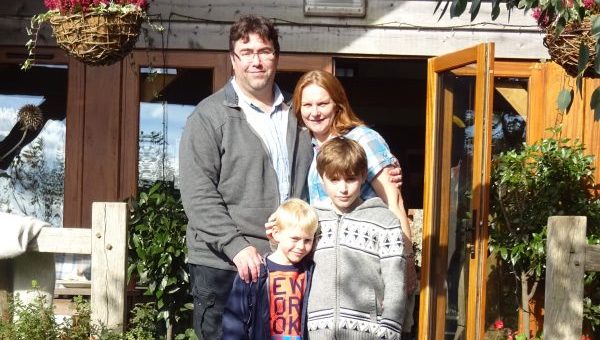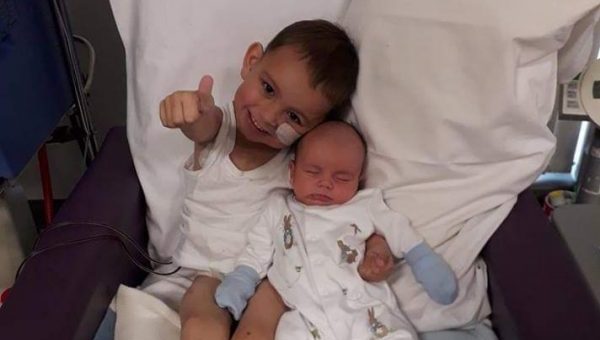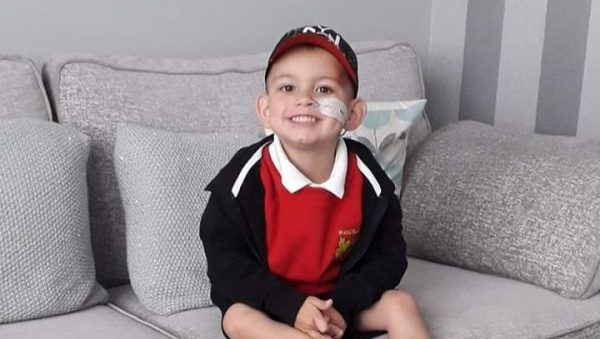Being told your child might die is horrific. Waiting for your child to turn a corner is exhausting. Finding a donor organ for your child is like winning the lottery. Going through this once is awful, going through it again with another child is unlikely.
Last year, I walked through the same door I had closed for what I thought would be the final time. Number ten Guilford Street had become a ‘Home from Home’ to me and my husband, Phil, when our eldest daughter, Lucie, underwent a heart transplant seven years ago. Suddenly I was back where I left, unlocking the door to The Sick Children’s Trust’s ‘Home from Home’ where I could rest while my youngest daughter, Isobel, waited for a lifesaving donor heart just like her sister had.
Lucie and Isobel are very different characters. Lucie is creative and quiet while her little five year old sister is confident and feisty, but they share something unique. Both have the same rare heart condition called dilated cardiomyopathy, where the heart becomes enlarged and can’t pump blood effectively. Both have been listed on the urgent transplant list and both have received a new heart.
“Having a place to stay at The Sick Children’s Trust’s Guilford Street House meant we didn’t have to move around every day and could focus our energy and time on Lucie.”
There are so few organs available for children and in the years between Lucie and Isobel’s experience, something seemed to change. When Lucie needed a heart, people were so positive. It was almost a certainty that we would get a heart for her. For Isobel, we were told there was a shortage and her life was in danger.
It was 2012 when Lucie had a cardiac arrest. It took doctors nearly an hour to bring her back and once they did we were sent to Great Ormond Street Hospital (GOSH). For the first few days, we were given accommodation at the hospital. I remember every day having to pack up our room and I followed Phil with a suitcase to our next room. It was frustrating as we were wasting precious time that could’ve been spent with our daughter in intensive care. Lucie was placed on a Berlin Heart – which takes over the heart’s function while we waited for a donor heart to become available.

For anyone who has doubts about whether to become an organ donor, all it would take is a visit to the cardiac unit to put pen to paper and sign the register. Before Lucie needed a transplant, neither Phil nor I were organ donors but we soon became desperate for a heart for our daughter. You can’t be willing to take if you’re not willing to give. All of us are registered organ donors now.
“When Isobel was waiting, two children died and two received hearts. It’s like a Russian roulette.”
We were told we could be waiting for up to a year for a heart to become available, and while we faced an indefinite wait we were given a place to stay by The Sick Children’s Trust. This meant we didn’t have to move around every day and could focus our energy and time on Lucie. It also meant that Lucie’s brother Jude, who was just a few months old, could come and stay with us.
Lucie didn’t have to wait long. In fact, her wait was really short – just eight days. But her post-transplant recovery wasn’t easy. She experienced issues with rejection and faced endless battles. She is now 11 years old and is much more than a walking transplant. She recently said ‘Why wouldn’t people donate their organs? It’s going to help someone.’ Maybe the answer is people don’t understand the difference it makes. The comfort it brings.
“Guilford Street House was vital because it meant Isobel’s siblings could come and stay. We’d make these visits for Lucie and Jude special by taking them around London in between seeing Isobel. Their company really spurred her on.”
To describe being told that there’s an organ available for your child is what I imagine winning the lottery to be like. It’s an unbelievable feeling. Every day that passes comes with increased risk so when you’re told that it is happening, it’s a weight being lifted off your shoulders. I was so relieved I cried.
When Isobel was waiting, two children died and two received hearts. It’s like a Russian roulette.
Isobel had a cardiac arrest the day after she was admitted to GOSH. Things got worse when a few weeks later she had a massive bleed on her brain and was rushed into surgery. We had no idea to what extent her brain would be damaged and until she recovered she wouldn’t be listed for the heart she needed. If Isobel had died then, we would’ve donated her other organs. I’ve been in that situation and seen how it helps. I know how it helps. I understand its hard as a parent to make that decision, but a part of that child carries on.

At this point Isobel was really ill and having a place to stay at Guilford Street House was vital because it meant Isobel’s siblings could come and stay. We’d make these visits for Lucie and Jude special by taking them around London in between seeing Isobel. Their company really spurred her on.
“To be around the corner from the hospital and have your own space to go to at the end of the day is invaluable. You need that headspace. On the wards you’re surrounded by people every day and being told awful things by the doctors about your children. It was a blessing to go back to Guilford Street House and just close the door shutting the world outside.”
When Lucie stepped onto the heart unit, it gave other families hope to see a child who had survived. Lucie loved chatting away to everyone and both her and Jude enjoyed being at the hospital. It was a great distraction for me having them there. It helped me in more than one way, for example when they left with Phil, I didn’t feel lonely or find it hard because in my room at Guilford Street House it was covered with their things. It made it feel like an extension of our own home.
As a parent, I’m always waiting for something to go wrong. When Lucie was in hospital I wouldn’t leave her side as I was terrified something bad would happen. I was terrified something terrible would happen to Isobel if I wasn’t there, but it did happen. That’s when she had her cardiac arrest. I learnt from my experience with Lucie. I made sure I ate, grabbed tea, went for walks and swims rather than constantly being by the bedside. By doing this I felt a lot more positive which was better for me and Isobel.
To be around the corner from the hospital and have your own space to go to at the end of the day is invaluable. You need that headspace. On the wards you’re surrounded by people every day and being told awful things by the doctors about your children. It was a blessing to go back to Guilford Street House and just close the door shutting the world outside. Though I knew if I needed to talk to someone there were likeminded parents around and staff, like Tina, on hand with a friendly ear to listen. People deal with these situations in their own way and the layout of Guilford Street House appeals to everyone.

When you’re told that your child has an offer of an organ, everything happens quite fast and luckily, we were never far away. When the girls went into theatre, I wasn’t nervous. We’d gone from being told the worst could happen to being on the other side. I cried. I was so relieved and excited but also felt guilty for feeling that way. I knew someone else had lost their child.
I hope no parent has to experience it and if they do for it to only be once. We appreciate that we have been unlucky for two of our three children to need a heart transplant but recognise how lucky we are for both of them to have received a heart. Receive one so quickly. And to have lived.
If someone does have to go through it, I hope they receive the same excellent treatment we did from GOSH and support from The Sick Children’s Trust. As being close by makes a huge amount of difference when your child is on the edge.
Joanna Perry
Lucie, Jude and Isobel’s mum


